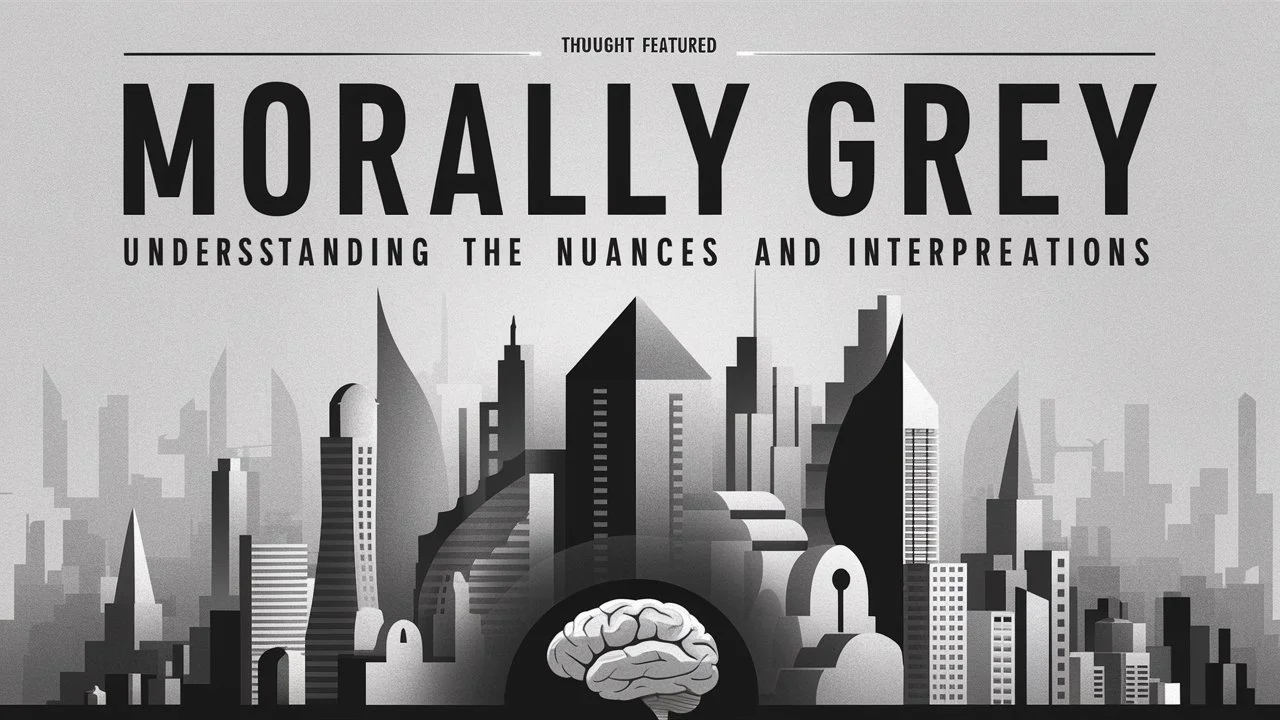Introduction
The phrase “morally grey” is often used to describe people, actions, or situations that do not fit neatly into the categories of right or wrong, good or evil. In literature, media, and real-life ethical debates, the concept of moral ambiguity challenges traditional black-and-white views of morality.
This article will explore the meaning of “morally grey,” its usage in different contexts, and alternative ways to express similar ideas. We will also provide 11 user-friendly texting examples to illustrate how the term can be used in casual conversations.
Whether you’re discussing complex characters in a novel, ethical dilemmas, or real-world decisions, this guide will help you understand and apply the concept of moral ambiguity effectively.
What Does “Morally Grey” Mean?
The term “morally grey” (or “morally gray”) refers to actions, decisions, or individuals that do not fit into clear categories of right or wrong. Unlike purely good or evil characters, morally grey individuals often have conflicting motivations that make their morality subjective and open to interpretation.
Key Characteristics of Morally Grey Concepts
- Mixed Intentions – A morally grey person may do good things for selfish reasons or bad things for noble reasons.
- Situational Ethics – The right or wrong nature of their actions depends on the context.
- Emotional Complexity – They evoke mixed feelings from others, making it hard to judge them definitively.
- Justified Actions – Their actions often have logical justifications, even if they are ethically questionable.
- Shades of Good and Evil – They are neither fully heroic nor entirely villainous.
Common Usage of “Morally Grey” in Different Contexts
1. Literature and Film
Many fictional characters are morally grey because they exhibit both good and bad traits. These characters are compelling because they challenge traditional morality.
Examples:
- Severus Snape (Harry Potter) – A man who acted cruelly but ultimately worked for the greater good.
- Walter White (Breaking Bad) – A protagonist who started with noble intentions but became a ruthless antihero.
- Loki (Marvel Universe) – A trickster who sometimes helps heroes but often serves his interests.
2. Real-Life Ethics
In real life, moral grey areas appear in politics, law, and personal choices. Ethical dilemmas, such as whistleblowing, self-defense, or lying to protect someone, fall into this category.
Examples:
- Doctors prioritize patients in emergency rooms based on survival likelihood.
- Journalists expose sensitive information that could help or harm society.
- Leaders make difficult decisions during crises, balancing morality and practicality.
17+ Alternative Ways to Say “Morally Grey”
Sometimes, you might want to express the idea of moral ambiguity in different terms. Here are several alternative phrases based on formality and tone.
1. Polite and Professional Alternatives
| Alternative | Meaning | Example Usage |
| Ethically Complex | A situation with no clear right or wrong choice. | “The decision to release the report is ethically complex.” |
| Morally Ambiguous | A person or action that could be seen as both good and bad. | “His role in the negotiations was morally ambiguous.” |
| Ethically Challenging | A scenario that requires difficult moral decisions. | “Leading a company often involves ethically challenging choices.” |
| Ethically Unclear | A situation without a clear ethical guideline. | “The new policy is ethically unclear and requires further discussion.” |
| Ethically Dilemmatic | A decision that involves a moral dilemma. | “Implementing the new rule presents an ethically dilemmatic situation.” |
2. Casual and Conversational Alternatives
| Alternative | Meaning | Example Usage |
| Shades of Grey | Neither fully right nor completely wrong. | “This issue isn’t black and white—there are a lot of shades of grey.” |
| Questionable Morality | Actions that may be morally debatable. | “That politician’s decisions have some questionable morality.” |
| Ethically Dubious | Something that seems suspiciously unethical. | “His reasoning for the deal was ethically dubious.” |
| On the Fence Morally | Someone who struggles to decide between right and wrong. | “He’s always on the fence morally about these things.” |
| Not Clearly Right or Wrong | A simple way to express moral uncertainty. | “The situation is not right or wrong, so we should discuss it further.” |
3. Philosophical and Literary Alternatives
| Alternative | Meaning | Example Usage |
| Moral Relativism | The belief that morality depends on culture and situation. | “Moral relativism suggests that what’s wrong in one society may be acceptable in another.” |
| Moral Dissonance | Internal conflict over ethical issues. | “He experienced moral dissonance after making the tough decision.” |
| Ethical Duality | The presence of both moral and immoral elements. | “The character embodies ethical duality throughout the story.” |
| Conflicted Ethics | When someone struggles to choose between right and wrong. | “The lawyer had conflicted ethics about defending the client.” |
11 User-Friendly Texting Examples for “Morally Grey”
Texting often requires short and clear messages, so here are some casual and professional ways to express moral ambiguity in text form:
- “Not sure how I feel about it—it’s kind of morally grey.”
- “That decision isn’t black and white. There are shades of grey.”
- “It’s a tricky situation, ethically speaking.”
- “Not right or wrong—just somewhere in between.”
- “His actions were questionable, but he had good intentions.”
- “It’s ethically complex, so I’m not sure what the right call is.”
- “Morally speaking, it’s a tough one to judge.”
- “The choice is ethically challenging—depends on how you see it.”
- “A little on the fence about this, to be honest.”
- “There’s no clear right answer—it’s all grey area.”
- “That’s a morally ambiguous move—could go either way.”
How to Choose the Right Alternative
When selecting a phrase to replace “morally grey,” consider:
✔ Audience – Use professional terms like “ethically complex” in formal settings.
✔ Context – If discussing literature or movies, use terms like “ethical duality.”
✔ Tone – Casual conversations can use “shades of grey” or “on the fence morally.”
✔ Clarity – If unsure, a simple phrase like “not right or wrong” works well.
Final Thoughts
The concept of moral ambiguity is essential in understanding complex decisions, characters, and ethical dilemmas. Whether in fiction, philosophy, or real life, “morally grey” helps describe situations that don’t have a clear right or wrong answer.
By using alternative phrases like “ethically complex” or “questionable morality,” you can express the same idea in different tones and contexts. Additionally, the 11 texting examples make it easier to communicate moral ambiguity in casual discussions.
Understanding shades of morality helps us think critically, appreciate complex narratives, and navigate difficult real-world decisions.





